Outside of Argentina’s highest criminal court in June 2022, Iris Pereyra de Avellaneda prepared for her latest battle. She adjusted her long, black scarf, grabbed a banner emblazoned with a drawing of her young son’s face, and joined dozens of other activists gathered on the sidewalk.
“El Negrito vive,” their signs read. “Cárcel a los genocidas.” “El Negrito lives. Imprison the perpetrators of genocide.” It’s been Avellaneda’s battle cry for nearly half a century.
Forty-six years earlier, less than a month after the coup that brought the notorious U.S.-supported military junta to power, armed forces kidnapped Avellaneda and her fifteen-year-old son, Floreal, secretly imprisoning and torturing them.
They were victims of a brutal period of state terrorism that has since been declared a genocide. Between 1976 and 1983, security forces killed or disappeared more than 30,000 people. A month after the kidnapping, the body of El Negrito—the affectionate nickname for Floreal—was found off the coast of neighboring Uruguay, bound and beaten, with signs of impalement; he had been dropped into the Río de la Plata from one of Argentina’s notorious “death flights.”
Avellaneda, now eighty-four, was released more than two years later. Since then, she has dedicated her life to ensuring that Floreal’s killers go to prison and stay there, a mission that has proven arduous.
From 2006, when trials for dictatorship-era crimes against humanity were reopened, to today, more than 1,100 members of the repressive military network have been tried and convicted in Argentine courts—several of the perpetrators in Floreal’s case were among them. Hundreds of cases are still being processed in ongoing investigations and sixteen open trials.
But since 2015, an increasing percentage of those implicated in such crimes have retained their freedom, while most who have been detained receive mitigating benefits, such as house arrest.
Data from the Attorney General's Office for Crimes Against Humanity show that most of those investigated for or convicted of genocide since 2006 are not in prison, including key figures in Floreal’s killing. Only about a quarter of prosecuted cases have final sentences, thanks to a time-consuming appeals process that ping-pongs between courts. Meanwhile, as the years pass and the perpetrators of the violence get older, nearly as many of them have died while under investigation as have been convicted.
The assertion of such judicial leniency toward former members of the military was among the complaints leading to the start of impeachment proceedings against the entire supreme court in February. One of the hearings focused specifically on a 2017 ruling, which Estela de Carlotto, president of the human rights organization Grandmothers of the Plaza de Mayo, claims “opened the door of freedom to the perpetrators of genocide.”
The result, human rights advocates say, has undermined decades of internationally recognized efforts to seek justice and compels survivors like Avellaneda to return to the courts again and again for the same, time-worn fights.
On June 8, 2022, the fate of Santiago Omar Riveros, the military commander who oversaw Floreal’s murder, was once again uncertain, and Avellaneda flashed back to her life’s most tragic chapter.
In March 1976, Argentina’s newly empowered junta initiated its plan of systematic repression, purportedly to wipe out armed guerrillas. But the reign of terror overwhelmingly swept up innocent victims, many for reasons similar to the Avellanedas. Avellaneda’s husband, who escaped, was a union delegate, and organized workers were among those most targeted during the military’s attempts to squash resistance to “Washington Consensus” economic policies. The Avellanedas also belonged to the local Communist Party, and Floreal participated in the Communist Youth Federation.
“They treated us like animals just because we thought differently,” Avellaneda recalls in an interview with The Progressive. She is now president of the Argentine League for Human Rights, known as La Liga.
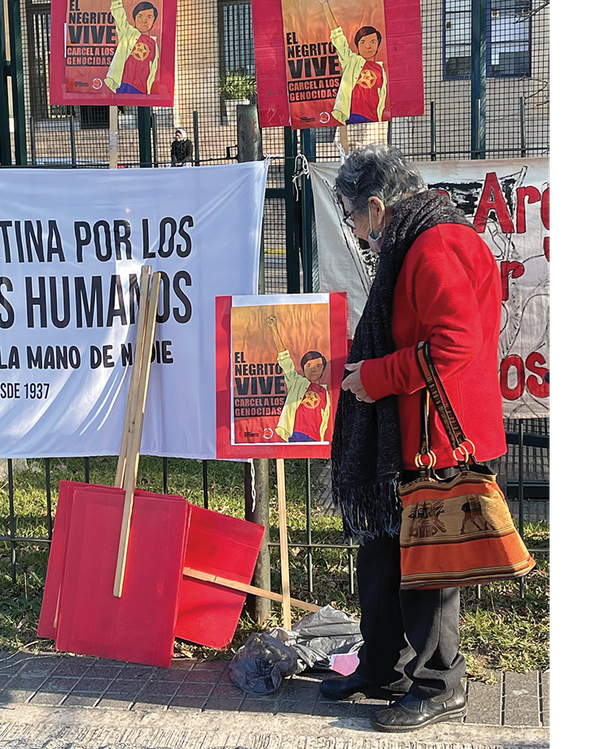
Iris Pereyra de Avellaneda continues protesting the murder of her son, Floreal. (Amelia Rayno)
Avellaneda and Floreal were taken to Campo de Mayo, among the deadliest of the more than 800 secret detention camps scattered across Argentina at the time. There, Riveros was the supervisor of terror, in charge of a facility where an estimated 6,000 people were held, and the survival rate was less than 1 percent.
By June 2022, Riveros had collected six life sentences and nine additional ones of eighteen years or more. But astonishingly, a federal court had just granted him conditional release—though sentencing in another pending case prevented his immediate release—drawing Avellaneda and the others to the courthouse steps.
That wasn’t their only reason for that day’s protest: Besides the issue of Riveros’s conditional release, the cases of three other people directly implicated in Floreal’s murder had been bouncing through the legal system or sitting backlogged for almost a decade and now awaited this tribunal’s final word.
Avellaneda shook her head. “We’ve had this fight for so long,” she says. “Forty-six years since the coup, and still no justice.”
Over the past several decades, the Argentine judiciary has been a polarizing entity in the nation’s fight for justice—alternately the wheel and the cog that stops it. During the dictatorship, the junta-installed judiciary functioned as another tool of repression, ensuring that victims and their families had no legal recourse.
Avellaneda said that while she was detained, she and her sister-in-law filed “muchísimos” writs of habeas corpus that were ignored. Between 1976 and 1979, nearly 5,500 writs of habeas corpus were submitted in Buenos Aires alone, according to Argentina’s National Commission on Disappeared People. Zero were granted.
When democracy returned in 1983, five of the top nine military commanders were convicted in the Trial of the Juntas, a globally significant moment that inspired the recent Oscar-nominated film Argentina, 1985.
But the triumph was short-lived. By 1987, threats of another military uprising forced then President Raúl Alfonsín to pass a pair of laws freezing trials and freeing hundreds of prisoners. The next president, Carlos Menem, reversed progress even further by pardoning the top brass who had been convicted and jailed just a few years earlier.
After leftist politician Néstor Kirchner won the presidential election in 2003, the supreme court declared the amnesty laws unconstitutional, and trials began again with urgency in 2006. But after Mauricio Macri, a conservative, took office in 2015, he named two supreme court justices by presidential decree instead of seeking senate approval—and the court swerved right again. This is when human rights advocates say an important shift occurred, a sentiment that is reflected in the trial data.
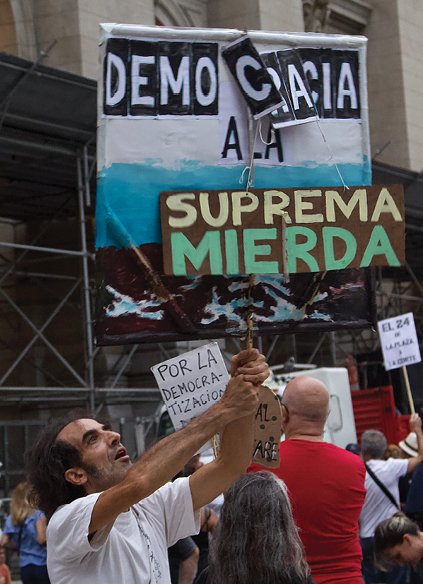
Protesting judicial delays and favorable treatment by courts of defendants investigated for genocide. (Amelia Rayno)
In 2017, the supreme court ruled that “2x1,” a defunct law originally aimed at reducing the prison population, was applicable for people who were convicted of crimes against humanity. It meant that after the first two years of pretrial detention, the number of days a detainee spent incarcerated should count as double. Mass demonstrations at the capitol building and an uproar in the congress ultimately pressured the supreme court to revoke the ruling, but many say the court continues doling out the spirit of “2x1” anyway.
In 2015, among all of those investigated for crimes against humanity, 1,070 were detained while 791 were not. By 2022, with trials and investigations continuing, the trend had reversed, with 717 detained and 1,506 free. Last year, 77 percent of those detained were under house arrest, and only 30 percent were required to wear an ankle monitor.
Though there are no published approval ratings for the nation’s top court, anecdotally, criticism abounds. Earlier this year, President Alberto Fernández initiated the impeachment proceedings, but he has so far lacked the political clout to fill a vacancy that a Kirchner-appointed judge’s retirement in 2021 created. Vice President Cristina Fernández de Kirchner (no relation) has called the judiciary a “mafia.”
On this year’s National Day of Remembrance for Truth and Justice—which marked the forty-seventh anniversary of the coup— on March 24, a protest formed at the supreme court building following the main march in honor of victims of state terrorism.
Four decades after the return of democracy, a sixty-nine-year-old protester named Manuel Iglesias lamented, “We still have trials that haven’t been finalized. When there are no convictions, justice disappears.”
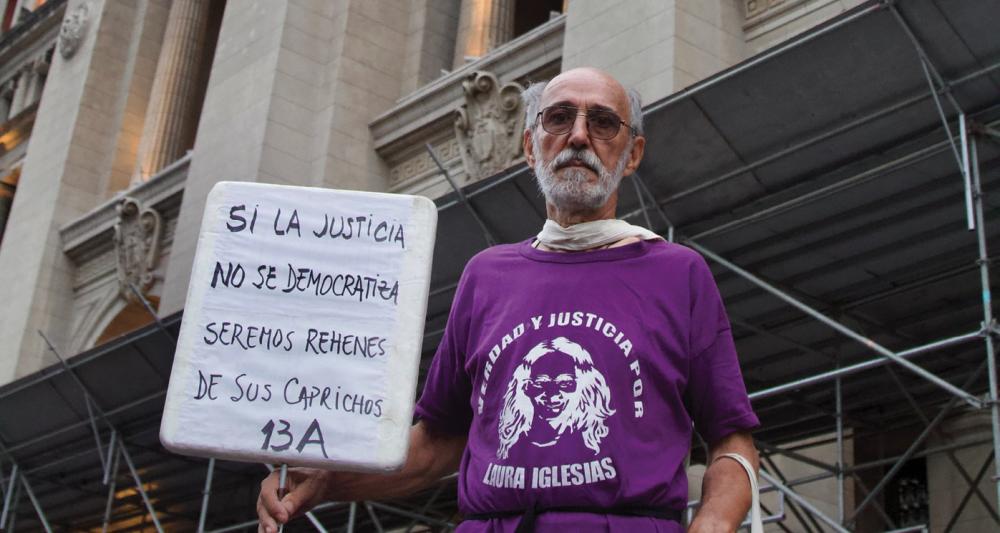
Manuel Iglesias: “We still have trials that haven’t been finalized. When there are no convictions, justice disappears.” (Amelia Rayno)
Many Argentines say that, system-wide, the rightwing ideology that characterized the dictatorship still prevails, along with the judiciary’s deep connections to economic and political power.
“After 1983, [judicial officials] continued to work in their office,” Mariel Alonso, a human rights anthropologist who previously worked at Argentina’s Center of Legal and Social Studies, tells The Progressive. “At the lower levels, some of the same people hold the same positions. A who, during the dictatorship, rejected [writs of] habeas corpus continues to play a role within the judicial system.”
Another common criticism of the judiciary is the perception that it is deeply aligned with U.S. values, an especially sensitive matter given U.S. support for the dictatorship. In the past few decades, the United States has been active in training and advising judges in Latin America, including Argentina. In May, Supreme Court President Horacio Rosatti spoke at an annual summit that connects U.S. and Argentine officials with business leaders, echoing the International Monetary Fund’s critiques of Argentina’s monetary policy and extolling the virtues of U.S.-led neoliberalism, one of the junta’s core tenets.
“Many judges here take courses in the United States,” says Gerardo Etcheverry, an attorney for La Liga. “They go to the embassy to celebrate the Fourth of July.”
He says it’s difficult to know with certainty how this might affect the military cases, but what is certain “is that the political line—the majority of Argentine judges and prosecutors—is very close to the U.S. government.”
In the meeting room at Avellaneda’s La Liga office, potted succulent plants are perched next to drawings of Che Guevara.
Spry despite her graying hair and now widowed, Avellaneda maintains a packed calendar of protests, hearings, memorials, and interviews. One minute, she’s pouring cups of tea for her guests and plying them with cookies. Moments later, she’s banging her fist on the table and calling the federal courthouse a “den of criminals.” Other, much younger activists have a hard time keeping up, she concedes with a grin.
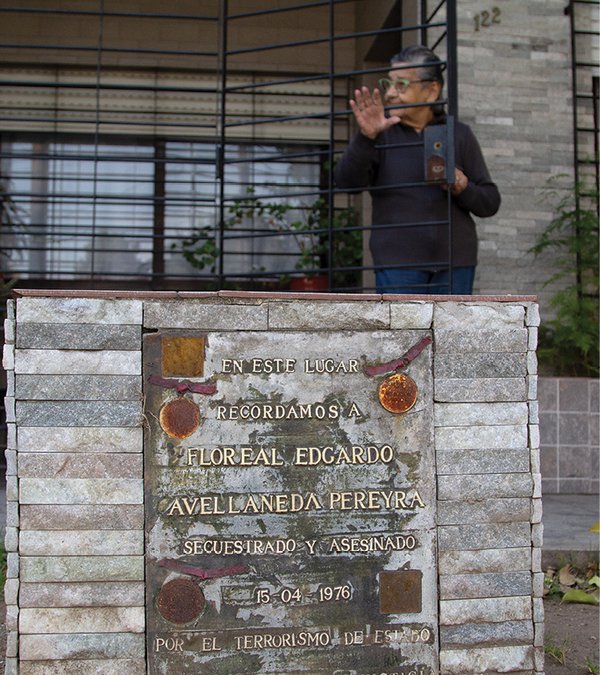
A plaque outside Iris Pereyra de Avellaneda’s home in Villa Tesei, Buenos Aires Province, honors her son, Floreal, nicknamed El Negrito, who was kidnapped and killed in 1976. (Amelia Rayno)
Her fight to lock up Riveros and the others dates back to the early 1980s, when she first brought a case. Suspended following the Alfonsín amnesty laws, that case finally went to trial in 2009, when the court gave Riveros a life sentence and two other military figures each eighteen years or more. Three other convicted repressors—César Fragni, Raúl Harsich, and Alberto Aneto—were sentenced to fourteen years or fewer in prison.
After Avellaneda appealed the light sentences, a higher court added jail time in 2013. Defense attorneys appealed, and the three men were released from custody. In 2021, the supreme court dismissed the case and returned it to the federal court, where it remained at the time of the June 2022 protest.
At those demonstrations, the atmosphere was tense. The previous week, courts had granted house arrest to three ex-military figures in cases involving other state terrorism victims and gave conditional release to a fourth, ostensibly because of poor health.
The same courtesy, Alonso observed, is noticeably absent in other criminal cases. “Ordinary sixty-five-year-old prisoners with diabetes don’t get house arrest,” she says. “The people who end up getting house arrest are the military.”
But at her office six days later, Avellaneda was enjoying a victory lap of sorts. The pressure of the protest had encouraged the federal court to finalize the sentences of Fragni, Harsich, and Aneto. With the appeals process finally exhausted, the state detained the men again. The same day, the country’s human rights secretary met with members of the judiciary, urging them to speed up the trials and end leniency for former members of the military.
“We won this hand,” Avellaneda proclaims. “We tired them out. We beat the court by wearing it down.”
The first chapter of Floreal’s case took thirteen years to resolve, and Avellaneda expects another round as the involvement of several others in his torture and murder is still being investigated.
Sluggish progress has been so characteristic of trials for crimes against humanity that it’s been dubbed “the recursive spiral” by the Attorney General’s Office for Crimes Against Humanity, which warns that delays have become “an obstacle in the judicial process.”
Since 2006, the courts have handed down sentences in 301 cases, but only eighty-three cases were final as of December 2022, with more than fifty waiting for supreme court action and others backlogged in other courts. In the cases concluded, the average time from arraignment to final sentencing was five years and three months. Meanwhile, given that most of the defendants are aging, death often ends the process before justice is served.
“It is good that justice has recursive instances because what a court says can have errors and it can be appealed,” Alonso says. “The issue is that we are talking about crimes that went to trial thirty-odd years later. And something quite perverse begins to happen, which is that, ultimately, the case never closes. You die without being condemned with a final sentence.”
Meanwhile, as survivors and family members of the disappeared also pass away, the momentum of the fight slows. Because Argentina’s main media outlets don’t often cover the trials, much less the ensuing sentence mitigations, many don’t even realize that the majority of convicted state terrorists are not in prison.
For some Argentines in their late thirties and younger, who have only known democracy, the movement is less personal. And today’s youth have pressing modern concerns to consider. Inflation is currently above 114 percent, one of the highest rates in the world and rising, and poverty rates are nearing 40 percent. Political polarization continues to grow with a presidential election scheduled for October.
For Avellaneda, it is a moment to exhale and reorganize. Fragni, Harsich, and Aneto are detained, although it is unclear whether they’ve been given house arrest. Riveros was handed two additional life sentences in the second half of last year, likely taking conditional release off the table indefinitely.
But Argentina’s judiciary has proven unpredictable, as Avellaneda acknowledged in a conversation at her home earlier this year. If impeachment fails and the country takes a rightwing turn in the elections, as some expect, the judiciary could be further emboldened in its dismissive attitude toward crimes against humanity. Avellaneda is more vibrant and energetic than most people her age, but she knows she’s quickly becoming an exception.
“I am eighty-four and still fighting, but there are many others already in bad health,” she says. “When are we going to finish with the trials? When we are buried and we can no longer do anything?”
Amelia Rayno is an independent journalist based in Buenos Aires.
Since 1909, The Progressive has aimed to amplify voices of dissent and those under-represented in the mainstream, with a goal of championing grassroots progressive politics. Our bedrock values are nonviolence and freedom of speech. Based in Madison, Wisconsin, we publish on national politics, culture, and events including U.S. foreign policy; we also focus on issues of particular importance to the heartland. Two flagship projects of The Progressive include Public School Shakedown, which covers efforts to resist the privatization of public education, and The Progressive Media Project, aiming to diversify our nation’s op-ed pages.
We are a 501(c)(3) nonprofit organization. We publish multiple stories every day on our website, and also produce a bimonthly magazine featuring investigative reporting, cultural and political analysis, and poetry. Donate

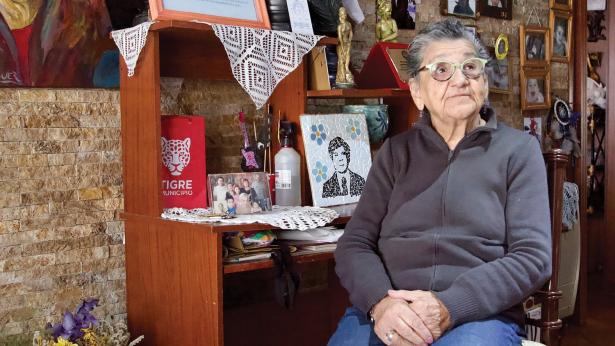
Spread the word